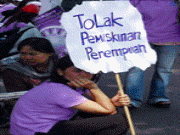Indonesian Migration and CEDAW

ASPEK Indonesia , UNI Apro’s affiliate in Indonesia representing the service workers are supporting the call for the government of Indonesia to rectify the Migrant Convention 1990 which will see that there is a protection guaranteed to the migrant workers.
Mohd. Rusdi the Secretary General of ASPEK Indonesia said that the union has actively participated in the dialogs on varies ILO and UNIFEM organized dialogs that push the need for the International Convention on the Protection of Migrant workers and their families as part of the CEDAW. He emphasis that its always the women that are the most effected - this includes the migration of women workers to look for jobs overseas without any protection and the women that are left behind to take care of their families single handedly when their husbands migrant for work.
 UNI Apro Women UNI Apro WomenNilaimon (UNI TLC Thailand) with Yoko Ogawa (UNI Apro Director of Women) and Siti Zaroah (ASPEK Indonesia) |
 Say "NO" to poverty. |
The participation from these dialogs had resulted in the need for the trade unions and like minded organizations to urge the government of Indonesia and the legislators to rectify the Convention for Migrant Workers 1990.
The need to look for jobs outside the country did not come easy for most people. However due to the growing population in Indonesia and the lack of jobs in the country, the younger generations of Indonesian had to find work outside their countries; often seeking jobs in the construction, plantation and service industries. It is also not cheap as these people need to folk out money to pay for the passage, legal documentations, work permit and agency fees. This "start up" cost would take out 3-6 months of these workers salaries.
While these workers are received in the country of destination, it is a known fact that unionization of forming of association by the migrant workers are not encouraged thus their rights as workers are violated. In particular, cases where workers entered a country as migrant workers with proper documents but subsequently, the employer may decided not to hire them thus cancelling their work permits - instantly making them as "illegal" migrants or "undocumented" migrants.
"While receiving countries had been heavily criticized, it was noted that the originating countries has not been providing adequate protecting and recourse to these workers. So its about time so stop passing the issue around" says Siti Zaroah, ASPEK INdonesia Women Charperson and UNI Apro Women Committee member.

